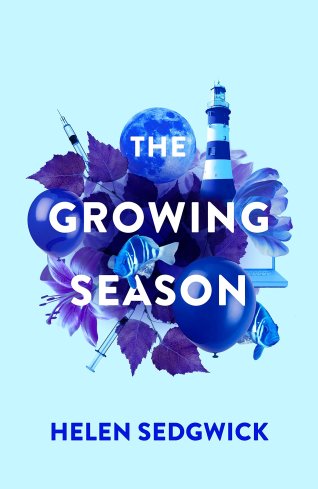
I’ve been waiting to read The Growing Season ever since I heard its premise. In an alternate version of the present, FullLife now offers UK parents – or at least those who can afford their birth plans – an alternative to pregnancy. Instead, adults can purchase a wearable pouch, which is warm, soft and comfortable, and carry their baby to term. Men and women can take turns wearing the pouch, instilling a sense of equality that continues after the birth, and same-sex couples, trans people, and single parents can all have their own biological children. However, the novel begins as FullLife realises that something is wrong with their technology. The pouch promised a completely safe gestation (something that seems unlikely to me given that many of the embryos are naturally conceived, so are presumably as vulnerable to genetic defect as any other embryos, but this is what the novel establishes), but now babies are being stillborn. What is wrong with the pouches – and does this prove that those who protested against them were right all along?
When I reviewed Naomi Alderman’s The Power, I suggested that this novel might tell a story that The Power didn’t address; how far is women’s oppression tied to the fact that they carry, bear and often nurse children, and what happens if you take that away? Sedgwick’s answer is satisfyingly complicated, and whatever your instinctive reaction to the idea of an artificial womb, there’s probably something in this novel that will force you to think again. Sedgwick employs a range of fascinating characters, not only to consider the intellectual arguments, but to explore the emotional impact pouches have had after three generations of use. For Holly Bhattacharyya, who resisted the established gender roles in her conservative family to be the first person to use a pouch, the pouch is a symbol of liberation, the ‘meaning of her whole life’. Holly is fully aware of the dangers of ‘natural’ pregnancy and childbirth for both mother and baby, and ‘she was not going to give up on her better world.’ For Eva, a professional protester, whose mother Avigail believed in the celebration of sexual difference, and feared that the pouch would make women obsolete, resisting is instinctive, part of her family inheritance; ‘she felt that she had to protect something that was being lost.‘ For Julianne, whose career has been enabled by the more gender-equal workplaces that have resulted from pouch birth, ‘the idea of carrying a growing life inside her for nine months just felt wrong. It felt unfair.’ For other women, like Holly’s nervous, silenced mother, the question is not about patriarchy or power: ‘ “Actually, I rather loved giving birth to my children,” she says.
Sedgwick resists a number of binary cliches in The Growing Season – technology is evil! Natural is good! Intellect is bad! – and it’s a much more powerful read for recognising, that for all these characters, both the facts and their feelings matter. Eva seeks justification for her natural revulsion against the pouch, but finding out that the rate of stillbirths is the same in pouches than in pregnancies helps her find a more balanced view. Similarly, Holly recognises that there may not be only one way for women to be freed. The society that Sedgwick imagines is clearly still patriarchal, although a patriarchy that has been modified through the widespread use of this technology, and, as such, it’s completely convincing. She’s particularly good at what-ifs; abortion becomes much less common now embryos can be transferred into pouches, but what happens to all the children born without parents – especially now adoption is much less common now infertile couples can use pouches? Do pouches facilitate domestic abuse, because men can more easily control unborn children, or reduce it, because women are no longer vulnerable when pregnant?
The Growing Season made me realise how much of my uncertainty about whether or not to have children is bound up with the realities of pregnancy, birth, and the way in which these biological processes enforce unequal relationships between men and women. Others will probably read it very differently, and one of the things that Sedgwick does so well in this novel is to make space for all kinds of reader, encouraging us to see the issue from other viewpoints, even if we think our opinions are fixed. This excellent book has received barely any critical attention, and I really hope the publishers give it more of a push when it comes out in paperback – it deserves to be read very widely.
Have you read Dreams Before the Start of Time? I think it deals with similar issues surrounding pregnancy and birth in a near future.
LikeLike
Just bought it on Kindle – 99p at the moment!
LikeLiked by 1 person
Yaaasss, that’s how I got it too’
LikeLike
This sounds really fascinating.
LikeLiked by 1 person
This sounds like such a thought-provoking read. I’ll definitely have to keep an eye out for it.
LikeLiked by 1 person
I feel weary of reproduction-themed dystopians — Red Clocks rather disappointed me — but I don’t know, maybe I’d still give this one a go. I do agree the premise is appealing. I’ve often joked to my husband that if I could incubate eggs or have a marsupial pouch I’d definitely have kids. Or, better yet, kittens if I could 😉
LikeLike
I haven’t read Red Clocks, but I think what I liked best about The Growing Season is that it’s not a dystopia.
I totally agree about the pouch, though I’d probably have puppies rather than kittens 🙂
LikeLike
Pingback: 20 Books of Summer: A Retrospective | Laura Tisdall
Pingback: Reading round-up, September 2018 | Laura Tisdall
Pingback: Holiday Reading Plans | Laura Tisdall
Pingback: Holiday Reading in the USA, Part Two | Laura Tisdall
Pingback: My Top Ten Books of 2018 | Laura Tisdall
Pingback: Who does your body belong to? | Laura Tisdall